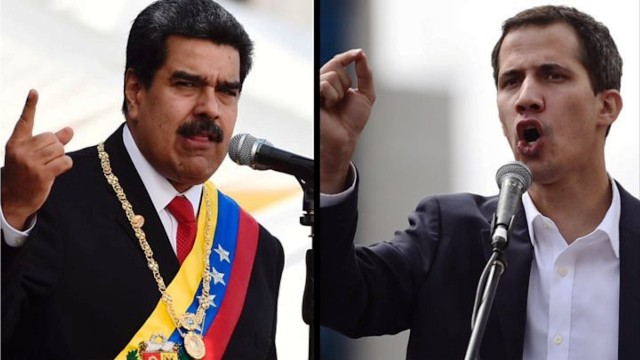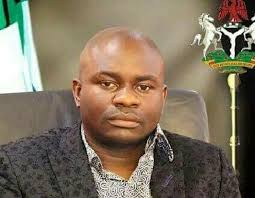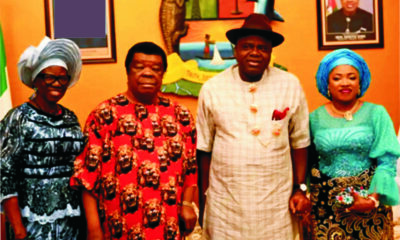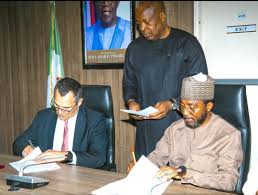Politics
Venezuela In Crisis

The crisis in Venezuela seems to be getting worse week by week following the disputed presidential elections held in May 2018 in which President Nicholas Maduro was re-elected.
Following the hues and cries, the national assembly become factionalised with the opposition controlled majority on the 10th of January 2019 recognising the parliamentary leader, Juan Guaido as the acting president of the country who eventually on the 23rd of January declared himself as the president of the country, a direct challenge to the incumbent president.
Why did this crisis start in the first place? According to political analysts, two major factors created this high level of political metability in venezuela a once prosperous and peaceful country. The first was the economic meltdown which began in 2010 under the presidency of the Late Hugo Chavez, and the non-compromising nature of the incumbent president Nicholas Maduro who the opposition claimed rigged the elections of 2014 and that of 2018. In addition to that, there are the allegations that apart from the rigging of the 2018 presidential elections, major opposition candidates were Prevented from running for offices.
As the political situation continues to deteriorate, the US, Bazil, Canada with some Latin American countries and some European Union countries have recognized Juan Guaido as President of venezuala while Russia,China, Cuba, Iran and their alised still recognise Nicholas Maduro as the legitimate president of the country.
As the tension continues to mount, some leading opposition figures have fled, some detained and attempts to factionalise the armed forces and the judiciary have so far failed and despite the sanctions imposed by the United States of America on venezuala, Maduro is still hanging on accusing the opposition for colluding with the American government for trying to overthrow his administration.
However, the opposition is not relenting in its effort to get rid of Maduro from office as the daily protest to oust him continues.
But what is quite worrisome is the unforeseen consequences of the action of the opposition. What if the protests turn violent and result in a civil war like that of Syria, which resulted in the destruction of over 40 per cent of the country’s infrastructure and displacement of millions of people. For now the scenario is relatively calm and hopefully the people of venezuela are more mature in their political outlook, that is both the opposition and members of the ruling party.
If Maduro were to be generally unpopular like Omar Al-Bashir of Sudan or Abdelaziz Bouteflika of Algeria he would have been removed from office long ago. In any case, every country is unique and what may work in country A, may not work out in Country B.
As the politicians lock horns for supremacy, one thing that they have tried to avoid with saner minds cautioning them is never to allow the country plunge into a civil war as dialogue and negotiations are always the best option in resolving issues. Otherwise, deadly armed merchants are waiting on the wings cash in whenever there is instability and the possibility of a civil war in any country.
The examples are many, that’s why even the United States of America is cautious in its approach to the crisis in Venezuela.
For a country to scide into such political crisis, several factors come into play such as personal ambition, the greed for power and foreign interest groups who might not like the politics of the incumbent in power or the possibility of creating chaos so that an individual or a politician who they believe will protect their interest will propped up to take over the reigns of government. So they are ever ready to use every means available to instigate crisis or cash on the existing crisis to achieve their aims by supporting a faction either through diplomatic support or financial inducement to bring about their desired change.
If people say that nobody benefits form chaos in the political life of any country, then we are still living in a fantasy world. Definitely, in every civil war, manufacturers of arms and ammunitions and providers of the necessary logistics and other accessories will hope to make sales and profit.
The economices of these countries will make improvements with job creation based on the increasing demands for their products and services. So one thing that should be paramount to the people of Veneuzuela is never to allow their country to become the next playground or battle field for any proxy war for merchants of death. They should learn from Libya, Somalia, Syria and Yemen.
They should also ask themselves why the western countries resolve their own political crisis without all these drama, bloodshed and the appeal for foreign support, whereas the reverse is the case for developing countries. It is only when we play into the hands of opportunists next target. Countries in Latin America have passed through violent revolutions after their independence from Spain and Portugal. They have also experienced brutal military dictatorships especially in the 20th century, and now that all of them are under democratic rule, there is no need or any of therebe it Venezuela to go book to the old path of bloodshed and war of attrition.
For any civil war to occur, it venezuala is only the people of venuzuela that will suffer the consequences and all what the United Nations will do is just to pass resolutions upon resolutions to end the conflict. Yemen is in a mess likewise Syria.
The future can still be better only if there is dialogue and trust.
Tonye Ikiroma-Owiye
Politics
LG Chairman-Elect Blames Insecurity On Parental Failure

Chairman-elect of Southern Ijaw Local Government Area of Bayelsa State, Hon. Target Segibo has alleged that the prevalent security challenges in some communities of the local government area could be traceable to parental failure on one hand, and frivolous lifestyle of children and wards involved in crime and criminality in the area on the other hand.
Segibo, who was a pioneer member of the State House of Assembly between 1999-2003, stated this in Yenagoa, the state capital recently while fielding questions from newsmen shortly after receiving his Certificate of Return from the Bayelsa State Independent Electoral Commission (BYSIEC).
He indicated his continued desire to work for the peace and rapid socio-economic development of the local government, noting that having been actively involved in the politics of the area for decades now, he was more grounded in working on modalities towards ensuring enduring peace and unity in troubled communities of the area.
The Chairman-elect who also lauded the state governor, Senator Douye Diri, the state’s leadership of the Peoples Democratic Party (PDP) and the electorate for finding him worthy to be elected Chairman of the local government, called on parents/guardiance not to renege on their primary responsibilities of watching over their children and wards, arguing that as the largest local government area in the state, Southern Ijaw should also be noted for peace and development.
“For over 20 years, I’ve been living peacefully with all my neighbours, both at home in Oporoma, headquarters of Southern Ijaw LGA and here, in Yenagoa.
“I’ve grown up children, but I don’t give them more than what they needed as students to go to school and stay okay as a father because I discovered that most of the security challenges we’re facing today in the Southern Ijaw LGA, and other parts of the state, is traceable to parental failure and children’s wanting to lead a frivolous lifestyle”, he said.
“As parents/guardians we should be able to know the kind of friends our children/wards keep. We must not pamper them. We must tell them that they have to do something legal to earn a living. We must question any source of sudden wealth and affluence on the part of our children and wards.
“But I want to assure our people of Southern Ijaw that as their incoming Chairman, when I’m sworn-in, having been actively participating in the politics and other activities of the area, collectively we’ll work to ensure enduring peace, unity and development of the LGA”, he added.
By: Ariwera Ibibo-Howells, Yenagoa
Politics
Bayelsa Assembly Grills, Confirms Diri’s Commissioner- Nominees

The Bayelsa State House of Assembly has screened and confirmed the first batch of Commissioner-nominees for Governor Diri’s second term State Executive Council.
The Tide gathered that the State Chief Executive in a bid to form his cabinet for his second tenure had earlier submitted a list of 14 names to the state legislature for confirmation as commissioners.
However, The Tide reports that only 13 out of the 14 nominees attended the constitutional exercise of the lawmakers.
Though no official reasons have been given, the immediate past Commissioner for Sports, who is also a former member of the state Assembly, Hon. Daniel Igali, was conspicuously absent during the screening exercise.
Inline with the House’s rules and Standing Orders, two other former members of the state Assembly who were also part of the nominees, Dr Gentle Emelah, immediate past Commissioner for Education, and Mrs Ebiwou Koku-Obiyai, were simply asked to take a bow and leave.
Following the exhaustive grilling, however, the immediate past Commissioner for Justice and Attorney-General, Mr Biriyai Dambo, SAN, his Finance counterpart, Mr Maxwell Ebibai, were confirmed.
Also confirmed were the immediate past Works and Infrastructure Commissioner, Moses Teibowei, Mrs Koku Obiyai, Dr Gentle Emelah, Ayibakipreye Brodericks, George Ekpotuatein Flint and Komuko Akari Kharim.
Furthermore, Mr Perepuighe Biewari, Dr Jones Ebieri, Barr. Peter Afagha, Mrs Bidei Elizabeth and Michael Magbisa received the nod to be appointed commissioners by the state lawmakers.
In his advice to the nominees shortly after their screening, Deputy Speaker of the House, Rt. Hon. Michael Ogbere, enjoined the Commissioner hopefuls to work as a team with those they will meet on ground, admonishing that they remain loyal to the government at all times.
On his part, Leader of the House, Hon. Monday-Bubou Obolo, said the people of the state expect a lot trom them and that the House will do its best to keep them on their toes through its oversight functions while giving them the needed legislative support where necessary.
By: Ariwera Ibibo-Howells, Yenagoa
Politics
NEC Meeting: PDP’ll Wax Stronger – Farah Dagogo

A former lawmaker representing Degema/Bonny Federal Constituency in the House of Representatives, Hon. Farah Dagogo, has described the outcome of the 98th National Executive Committee (NEC) meeting of the Peoples Democratic Party (PDP) as another demonstration of the resilience of the party to weather any storm that comes its way.
This is contained in a statement released bythe Special Assistant, Media and Publicity to the estwhile federal legislator, Ibrahim Lawal, at the weekend.
In the build up to the NEC meeting, suggestions and permutations had been rife of the likelihood of the PDP running into another round of crises as the party tries to navigate a path for the North Central Zone to produce a substantive National Chairman to complete the truncated tenure of former Chairman, Dr. Iyiorchia Ayu.
Speaking on the sidelines of the NEC meeting that saw Umar Damagum retain his position as the party’s Acting National Chairman until the next NEC meeting scheduled for August, Dr Dagogo said those who genuinely have the best interest of the party at heart made timely sacrifices to keep the party firm and afloat.
The former member of the National Assembly said but for the political maturity and sagacity employed by the party’s National Leader and former Vice President, Alhaji Atiku Abubakar, alongside other leaders, before and during the NEC meeting, the party would have ‘played into the hands of some individuals, who wanted the party to implode in order to improve their political fortunes’.
He expressed optimism that by the adjourned date of August, Damagum would have seen that “it is in the best interest of the party for him to vacate the position for a more purposeful and result oriented leadership’’.
“ For me, the outcome of the NEC meeting was a win-win situation. Against all odds, the party came out unscathed and will continue to wax stronger.
“Yes, the Acting Chairman retained his position, but it is obvious to him now and others that it would be in the best interest of the party for him to vacate that position for a more purposeful and result oriented leadership by August.
“The so called tension generated in the build up to the NEC Meeting was actually orchestrated by the inordinate desire of some few individuals who wanted to thwart the sterling call by party faithful for a review of its failing leadership and directionless.
“ The Party however did not play into the hands of those individuals, who wanted the party to implode in order to improve their political fortunes. Thanks in good measure to the political maturity and sagacity employed by the Party’s National Leader and Former Vice President, Alhaji Atiku Abubakar, alongside other leaders, before and during the NEC Meeting. We are where we are now because of their sacrifices and dedication to the party, “ he added.
-
Opinion3 days ago
Agriculture: Solution To Hunger, Inflation, Food Insecurity
-
News3 days ago
Pan-Igbo Group Hails Dangote Group For Reducing Diesel Price
-
Sports3 days ago
Minister Renews Hope For Sports Dev, Signs MoU
-

 Rivers3 days ago
Rivers3 days agoBayelsa LG Polls: BYSIEC Issues Return Certificates To Chairmen, Others
-

 Maritime3 days ago
Maritime3 days agoNPA Secures $700m Citibank Loan For Tin Can, Apapa Ports Rehabilitation
-

 News3 days ago
News3 days agoJAMB Sanctions Officials For Asking Candidate To Remove Hijab
-

 Opinion3 days ago
Opinion3 days agoCautious Optimism As Naira Rebounds
-
News3 days ago
Waive Tax On Electronic Imports, Women Engineers Appeal To Tinubu

